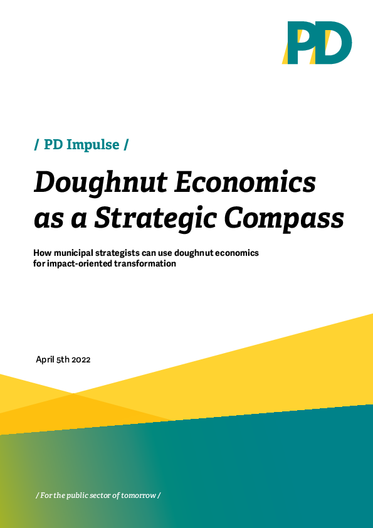These questions form the heart of a study, published in April 2022 as part of the ‘PD Impulse’ series, entitled ‘Doughnut Economics as a Strategic Compass: How municipal strategists can use Doughnut Economics for impact-oriented transformation’.
The research study addresses the holistic methods of Doughnut Economics, focusing on the issue of how to take better account of sustainability and social justice and how to put these goals into practice in German municipalities.
Urban administrations across the world have been using the ideas of Doughnut Economics for a long time – in Germany, by comparison, these methods are still at their early stages. The research aims to make Doughnut Economics, from the perspective of the work of German municipalities, accessible to a wider audience, to classify its recipes and to suggest recommendations for action. The methods underlying the Doughnut Economics approach are being continually developed by a network of international actors and stakeholders working as part of the bad, or DEAL. This process of thinking outside the box, as well as international participation in the PD Impulse study, offers huge opportunities for municipal bodies in Germany.
With the aid of two case studies – the cities of Bad Nauheim and Krefeld – this report in the PD Impulse series of papers illustrates how Doughnut Economics can transcend the limitations of traditional economic models. Issues around sustainability and societal fairness are consistently approached as parts of an interlinked whole so that municipal management and decision-making structures can be tailored in a strategic and impact-oriented way. The key ingredients of this approach are that it invites holistic thinking, offers sustainability-related strategies and provides participatory impetus to civil society entities.
In cooperation with the German Institute of Urban Affairs (Difu) and with input from 14 cities across Germany, PD has carried out research into the potential transferability of the Doughnut Economics recipe to the German municipal landscape. The overall conclusion is that this approach represents an effective communication tool that fosters integrated and effects-oriented thinking, strengthening the culture of participation in urban contexts and reinforcing evidence-based management of municipalities. To support this conclusion, the PD report had drawn on examples taken by cities as diverse as Nanaimo in Canada as well as Copenhagen, Amsterdam and Portland, Oregon.
Are you interested in testing out the doughnut recipe, to identify its potential for your municipality? PD’s team of dedicated Municipality Consultants are ready and waiting to help you find out how to create a Doughnut Economics on your own municipal stage!



